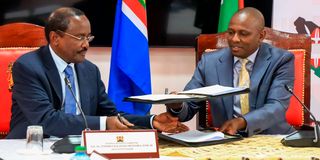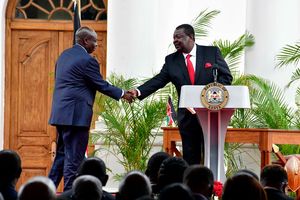
Wiper party leader Kalonzo Musyoka (left) and National Assembly Majority Leader Kimani Ichung’wah during the signing of the bipartisan talks framework agreement on August 29,2023.
President William Ruto and opposition Azimio la Umoja One Kenya coalition chief, Raila Odinga, are pushing for a seven-year term for senators in a bill that also seeks to establish the offices of Prime Minister and Official Leader of Opposition.
The Constitution of Kenya (Amendment) Bill, 2023 proposes new oversight funds for senators and a shorter period for determining the expulsion of rebel elected leaders in instilling party discipline.
The bill – a product of the National Dialogue Committee (NADCO) report – is jointly sponsored by National Assembly Majority Leader Kimani Ichung’wah and his Minority colleague counterpart Opiyo Wandayi.
Mr Ichung’wah and Mr Wandayi have sponsored nine bills – the Constitution of Kenya (Amendment )Bill, 2023, IEBC (Amendment) Bill, 2023, Elections (Amendment) Bill, 2023, NGCA (Amendment Bill, 2023, the Statutory Instruments (Amendment) Bill, 2023, EACC (Amendment Bill, 2023, Leader of Opposition Bill, 2023, Election Offences (Amendment) Bill, 2023 and Political Parties (Amendment) Bill, 2023 –in seeking to implement the NADCO report that was unanimously adopted by the National Assembly and Senate.
The bill seeks to amend Article 102 of the Constitution to have election of senators be held after seven years instead of five.
This implies that the country would have staggered elections – separate elections for senators and members of the National Assembly.
“Article 102 of the Constitution is amended by deleting clause (1) and substituting therefore the following new clause – amended by deleting clause (1) and substituting therefore the following new clause – (1) The term of a House of Parliament expires – (a) on the date of the next General Election in every fifth year, in the case of the National Assembly; and (b) on the seventh year from the date of the last election, in the case of the Senate,” proposes the Bill.
Legislative agenda
It adds that the Office of the Leader of Official Opposition would be occupied by the head of the party or coalition of parties that garners the second greatest number of votes in the immediate preceding presidential election.
The coalition may through a resolution pick another person instead of the party leader. The Official Leader of Opposition will have two deputies.
“The remuneration and benefits payable to the Leader of the Opposition and Deputy Leaders of the Opposition shall be a charge on the Consolidated Fund,” states the bill.
It also proposes the establishment of the Office of the Prime Minister, who shall be nominated and appointed by the President with the approval of the National Assembly.
Mr Musalia Mudavadi is the country’s Prime Cabinet Secretary. His position is not in the constitution.
“Clauses 11, 12 and 13 of the bill propose to amend Articles 130, 131 and 132 of the Constitution to institutionalise the Office of the Prime Minister, which is mandated to perform the key functions of co-ordination, supervision and implementation of national government policies, programmes and projects across ministries and state departments,” the document states.

President William Ruto (top left) and his Kenya Kwanza talks team and Azimio leader Raila Odinga (top right) and his team.
“The Prime Minister shall assist the President and the Deputy President in the coordination, supervision and implementation of the national government policies, programmes and projects across all ministries and state departments.”
Next elections
The holder will also coordinate the national government’s legislative agenda across ministries and state departments as well as perform any other function as may be directed by the President.
The creation of the PM office has the potential of altering the next elections as it offers an extra seat that could be crucial in cobbling political alliances in a country elections are ethnically influenced.
Similarly, the creation of an Office of the Opposition Leader and two deputies would offer a soft landing for a poll loser who emerges second in a presidential election.
It will somehow address the winner-takes-all scenario that has been blamed for post-election disputes that escalate to violence at times.
The Creation of Senate Oversight Fund has the potential of making the senate race more competitive.
For now, senators control no funds. This has made contests in the 290 constituencies more competitive compared to Senate races in the 47 counties.
“There is established the Senate Oversight Fund, which shall be a national government fund consisting of money appropriated from the national government’s share of revenue as divided by the annual Division of Revenue Act enacted pursuant to Article 218 of the Constitution,” the bill says.
“All money allocated under this Article shall be considered as funds allocated to the Senate pursuant to Article 206(2)(c) of the Constitution and is to be administered in accordance with the provisions of an Act of Parliament. Parliament shall enact legislation to make further provisions for the operation of this Article.”
The Independent Electoral and Boundaries Commission (Amendment) Bill, 2023, includes a proposal to increase the number of members of commission’s selection panel from the current seven to nine in order to accommodate a wide spectrum of stakeholders and interest groups.
It also seeks to include experience in accounting or ICT as additional professional qualifications for appointment as a member of the commission.
The proposed changes imply that the reconstitution of the electoral commission will have to start anew.
The proposed legislation to amend the 2010 Constitution comes barely three years after a similar attempt by Mr Odinga and then-president Uhuru Kenyatta through the Building Bridges Initiative (BBI).
The attempt failed after being declared unconstitutional by judges.

Embu Governor Cecily Mbarire, National Assembly Minority Leader Opiyo Wandayi and Majority Leader Kimani Ichung’wah in Nairobi on September 1, 2023.
In its memorandum, the bill states that it seeks to give effect to the recommendations and views submitted during the Bomas talks that stemmed from the disputed 2022 presidential election outcome.
Mr Odinga rejected President Ruto’s victory, leading to violent anti-government protests that saw the two leaders call bipartisan negotiations.
Promote national unity
“The principal object of this bill is to amend the Constitution by parliamentary initiative in seeking to resolve issues of concern to the people of Kenya, promote national unity and inclusivity, enhance representative democracy, transparency, accountability and good governance and establish adequate checks and balances,” it states.
The bill further seeks to entrench the National Government Constituency Development Fund (NG-CDF) and National Government Affirmative Action Fund.
“There is established the NG-CDF which shall...consist of money appropriated from the...share of revenue as divided by the annual Division of Revenue Act enacted pursuant to Article 218 of the Constitution,” the bill says.
The bill adds that the fund is aimed at complementing national government programmes on affirmative action.
It, however, omits a fund for Members of County Assembly that was contained in the NADCO recommendations.
The bill seeks to instil discipline in political parties by shortening the period for appeal over expulsion disputes to 90 days.
Rebel elected leaders have been exploiting a long and winding appeal mechanism to remain in Parliament, a scenario that has frustrated political parties to kick out errant members.
“Clause 9 of the bill seeks to amend Article 103 of the Constitution to provide that where a member of a political party, who was elected to Parliament resigns or is deregistered from the party in accordance with the Constitution, the office of the member shall become vacant. This is intended to promote party discipline and fidelity to political parties by removing the apparently unenforceable deeming provisions provided for in Article 103 of the Constitution,” the bill says.
The reasons for the deregistration of a member from a political party will, however, be exclusively determined in accordance with the Constitution or regulations of a party.









